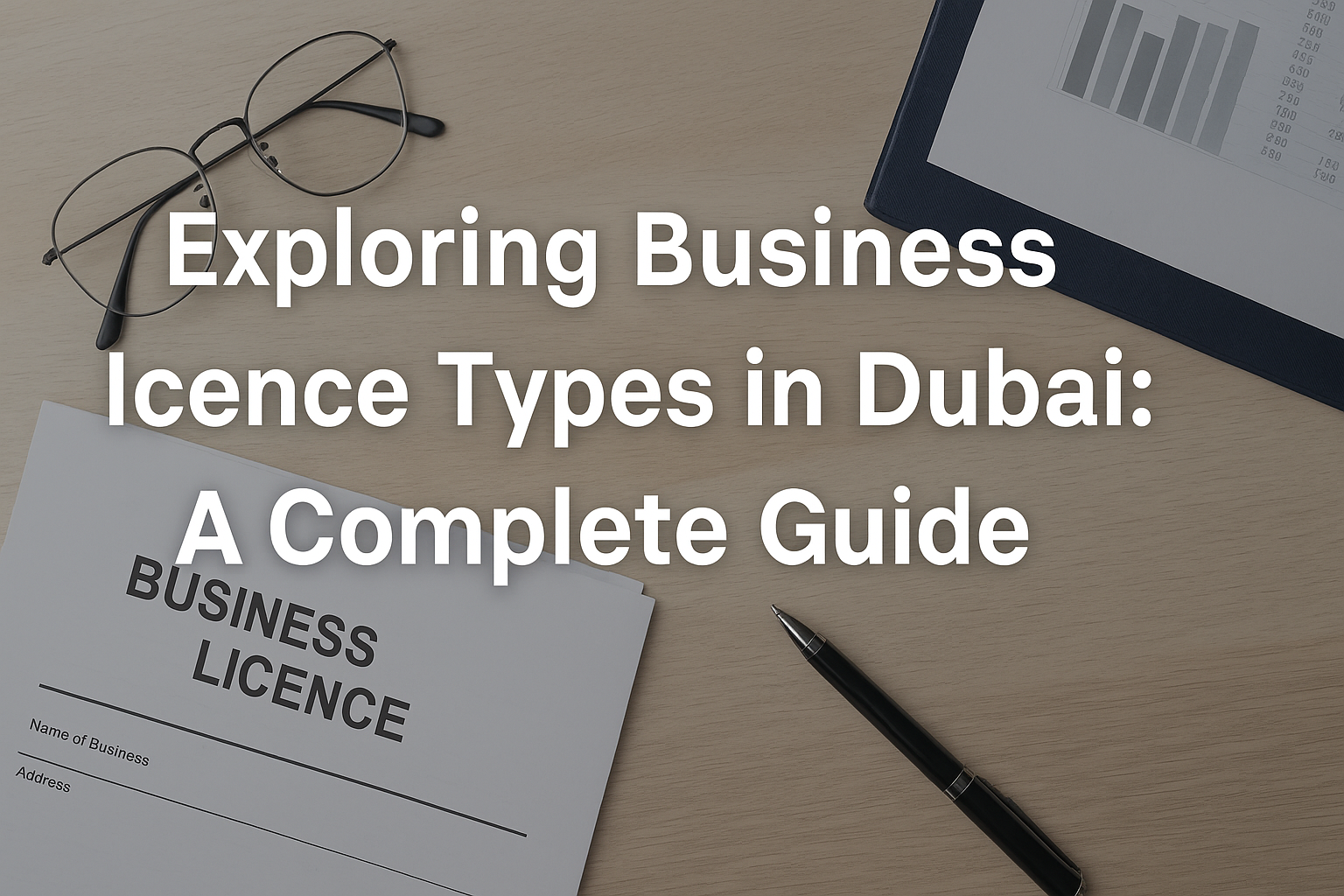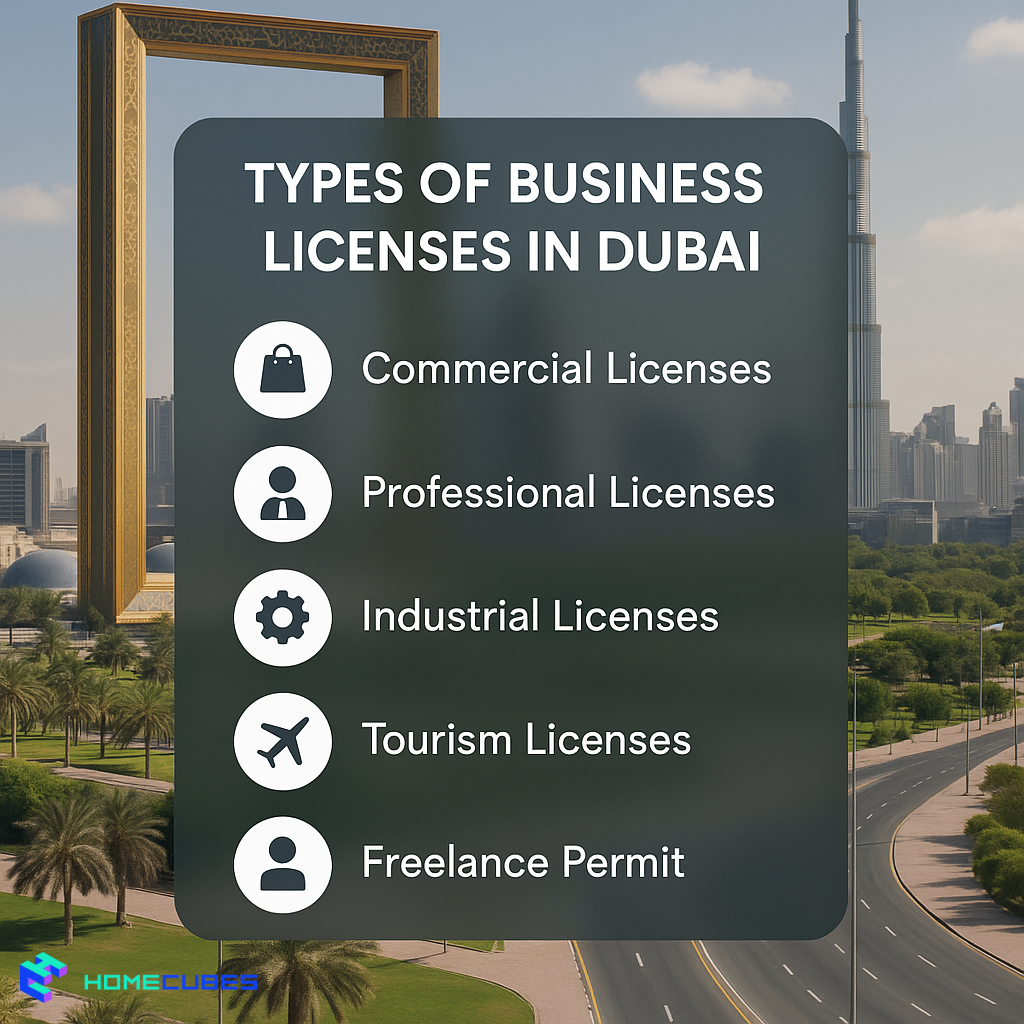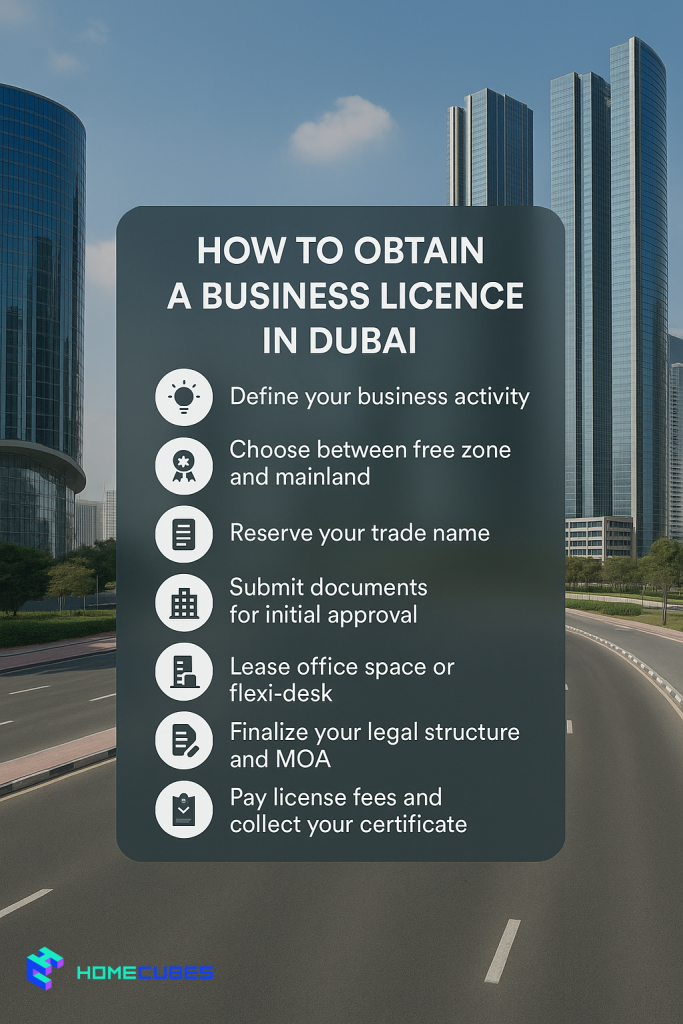

Table of Contents
- Introduction
- Overview of Dubai’s Licensing Framework
- Types of Business Licences in Dubai
- Commercial Licence
- Professional Licence
- Industrial Licence
- Tourism Licence
- Freelance Permit
- Free Zone vs Mainland: Key Licensing Differences
- How to Obtain a Business Licence in Dubai
- Fees and Charges Breakdown
- Common Mistakes to Avoid
- Case Study: Real Estate Tech Startup in DMCC
- Frequently Asked Questions (FAQs)
- Conclusion
- Get Expert Help with Business Licensing in Dubai
Introduction
Dubai has emerged as a beacon of opportunity for global entrepreneurs, investors, and digital pioneers. With its strategic location, pro-business policies, and forward-thinking leadership, Dubai offers an ideal environment for launching and expanding businesses. Central to this process is securing the correct business licence. Each licence type—whether commercial, professional, industrial, or specialized—dictates the kind of activity a business can legally perform. For those entering the UAE market, to explore Dubai’s smart investment map, understanding the licensing framework is a critical first step toward compliance and success.
🇦🇪 Dubai:
– Top 20 globally for ease of doing business
– Bridge between East and West markets
– Free Zone company setup in 3-5 days
– 9% corporate tax, 0% in Free Zones under certain conditions
– 100% foreign ownership allowedBoth offer world-class infrastructure and support. pic.twitter.com/c5XIUbPqL3
— Alessandro Palombo (@thealepalombo) October 29, 2024
This guide offers an in-depth look into Dubai’s business licence ecosystem, tailored especially for real estate, tech, and investment-focused entities, including emerging sectors such as blockchain and tokenized property models.
Overview of Dubai’s Licensing Framework
Dubai’s business environment is governed by a structured regulatory framework. The Department of Economy and Tourism (DET) is the primary authority that issues licences for mainland businesses. Meanwhile, over 30 free zones across Dubai, including Dubai Multi Commodities Centre (DMCC), Dubai Internet City (DIC), and Dubai Silicon Oasis (DSO), offer independent licence structures with their own regulations.
Key Licensing Characteristics:
- Over 2,000+ business activities are classified by the DET and free zones.
- Activities are categorized under commercial, professional, or industrial licences.
- Businesses can be structured as LLCs, sole proprietorships, branches, or civil companies.
- Some activities require special approvals from other government departments (e.g., real estate, healthcare, legal services).
- Many sectors now allow 100% foreign ownership (especially post-2021 reforms).
Types of Business Licences in Dubai

Commercial Licence
Issued for companies involved in trading, retail, import/export, and general commerce. Ideal for businesses dealing in physical or digital goods.
Common Activities:
Real estate brokerage, general trading, automotive parts, e-commerce, logistics. Several governmental authorities take care of the licensing depending on the nature of the job. For Real estate brokerage for example, companies must be registered with DLD (Dubai Land Department)
Requirements:
Office lease, trade name registration, activity approval, local service agent (if mainland-based).
Source: Dubai Department of Economy and Tourism
Professional Licence
Designed for service-based companies reliant on intellectual or artistic expertise. Allows 100% foreign ownership in most cases.
Common Activities:
Legal advisory, accounting, digital consultancy, blockchain services, marketing.
Requirements:
Academic credentials, service agreements, civil liability insurance, local agent (if required).
Industrial Licence
Applicable to firms engaged in manufacturing, processing, or assembling products in the UAE.
Common Activities:
Food and beverage production, furniture, garments, electronics, construction materials.
Requirements:
Warehouse facility, environmental clearance, MOIAT approvals, UAE partner for mainland.
Reference: MOIAT
Tourism Licence
Mandatory for any business involved in tourism, entertainment, or travel-related activities.
Common Activities:
Travel agencies, hotels, resorts, event management, tourist transport.
Requirements:
Insurance, tour guide licences, tourism approvals.
Freelance Permit
Suited for individual professionals working independently, especially in the creative and tech fields.
Common Activities:
Writers, designers, developers, musicians, translators, content creators.
Requirements:
Portfolio, NOC (if employed), yearly renewal.
Platform: GoFreelance.ae
Free Zone vs Mainland: Key Licensing Differences
Mainland Licence
Pros:
- Operate across all of UAE
- Government contract eligibility
- Unlimited client reach
Cons:
- Requires office lease
- Some activities need local agents
Free Zone Licence
Pros:
- 100% foreign ownership
- Low setup costs and shared spaces
- Business-friendly packages
Cons:
- Limited to zone and international markets
- Not eligible for government contracts
| Feature | Mainland Licence | Free Zone Licence |
| Ownership | 100% in most sectors | 100% foreign ownership |
| Scope of Operation | Entire UAE | Within free zone & internationally |
| Visa Eligibility | Based on office size | Often limited with flexi-desks |
| Government Contracts | Eligible | Not eligible |
| Office Requirement | Mandatory | Flexi-desk available |
How to Obtain a Business Licence in Dubai

- Define your business activity
- Choose between free zone and mainland
- Reserve your trade name
- Submit documents for initial approval
- Lease office space or flexi-desk
- Finalize your legal structure and MOA
- Pay licence fees and collect your certificate
Fees and Charges Breakdown
| Licence Type | Cost Range (AED) | Inclusions |
| Commercial | 10,000 – 30,000 | Activity fees, name reservation, office setup |
| Professional | 7,000 – 20,000 | Includes local service agent cost |
| Industrial | 25,000 – 50,000 | Facility lease, MOA, activity approvals |
| Tourism | 15,000 – 35,000 | Tourism authority approvals, insurance |
| Freelance Permit | 7,500 – 15,000 | One-activity licence, one visa (optional) |
Common Mistakes to Avoid
- Selecting an incorrect business activity
- Assuming all licences grant UAE-wide operation
- Ignoring visa quotas
- Overlooking third-party regulatory approvals
- Choosing an inappropriate free zone for your sector
Case Study: Real Estate Tech Startup in DMCC
A blockchain-driven real estate investment platform from Europe wanted to tokenize Dubai properties.
Challenges: Dual activity registration, 100% ownership, quick setup.
Solution: Registered in DMCC under both real estate and software services.
Result: Gained full foreign ownership, legal compliance, and launched in under 8 weeks with bank support.
Frequently Asked Questions (FAQs)
Can one licence cover multiple activities?
Yes, if they fall under the same category and are approved by the authority.
Do I need an office for all licenses?
Yes, for the mainland. Some free zones allow shared desks or virtual offices.
Can I apply remotely?
Yes. Many free zones allow remote online registration.
Are there tax benefits?
Dubai has 0% income tax. A 9% corporate tax applies on profits over AED 375,000 (2023 onwards).
Source: UAE Ministry of Finance
Conclusion
Dubai’s business licensing ecosystem offers unmatched flexibility, speed, and global reach for both startups and seasoned enterprises. With well-defined structures for commercial, professional, industrial, and freelance setups, there’s a clear path for nearly every type of business venture.
However, the licensing journey is not one-size-fits-all. Choosing the right jurisdiction, licence type, and activity can significantly affect your scalability, compliance, and market access. Free zones are ideal for foreign-owned startups targeting global clients, while mainland licences offer complete freedom to operate across the UAE and participate in government projects.
As Dubai continues to attract entrepreneurs in real estate, fintech, and digital innovation, understanding the nuances of licensing—such as regulatory requirements, tax eligibility, visa allocation, and permitted activities—will be crucial to long-term success.
By aligning your licence structure with your operational goals and market strategy, you ensure a smoother setup process, legal clarity, and a foundation built for scale. Whether you’re launching a freelance consultancy or a blockchain-powered real estate platform, the right licence is more than paperwork—it’s your key to Dubai’s booming market.
Get Expert Help with Business Licensing in Dubai
At Homecubes, we specialize in understanding the intersection of real estate innovation and regulation in Dubai. From blockchain-based tokenized property platforms to hybrid investment models, we follow the shifting legal landscape so you don’t have to.
Although we are currently awaiting our VARA license approval, we are actively preparing to assist future clients in navigating business licensing, platform integration, and smart property strategy.
If you’re exploring how to legally enter Dubai’s property investment ecosystem or want to structure your startup for long-term success, we’re here to help.
👉 Contact Homecubes for licensing insights, compliance advice, and startup support tailored to your investment goals.










